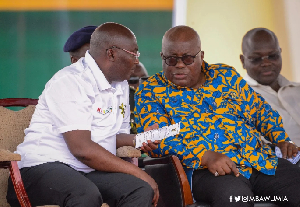NEWS-ONE has sighted a letter signed by actor Bill Asamoah, the Ashanti regional chairman of the Ghana Actors Guild (GAG), threatening legal action against the owners and operators of United Television (UTV) if the station goes ahead to telecast a local TV comedy drama series, ‘Abrabo’, it is currently advertising on its network.
The Guild has also instructed UTV to stop advertising the comedy drama series immediately.
According to the regional chairman of the Guild, some of the actors who cast in ‘Abrabo’, including Kwadwo Nkansah (Lil Win), Kwasi Boadi (Akrobeto) and Kwaku Manu do not want UTV to telecast the series because they were misled by the production company, Nakwadus Productions, into thinking they were shooting a movie but not a television series.
A source from the Guild hinted NEWS-ONE that though Nakwadus Productions duly paid the actors for the roles they played, they feel unhappy because the production house pieced together different scenes from several movies they have done over the years and compiled them into the series ‘Abrabo’, without any prior consultation with the cast.
This report was authenticated by the letter from the Guild which stated that though the actors were paid for the roles they played, they never signed any contract with the producers that what they were shooting would be translated into a drama series and therefore they do not want UTV to broadcast it.
Meanwhile, UTV had planned to start airing the series from this month, and it is not certain what the response would be.
A source at the station however said the letter from the Actors Guild has been duly responded, but no amicable settlement reached.
The television station established barely two years ago, belongs to the Despite Group of Companies, operators of Peace FM, Hello FM, Neat FM and Okay FM.
A 2014 survey on television viewership in Ghana conducted by Ipsos, a global market research company, has reported UTV has the largest viewership ratings in Accra, Kumasi and Cape Coast.
However, it is not that much of a surprise because it is largely a local content television station, and its medium of communication is about 60 percent Akan-dominated, followed by English and a little bit of Ga and Ewe.
The Ipsos survey had statistics for all the five weeks of the month of January and took into consideration all the television stations in the country.
Movies of Tuesday, 2 September 2014
Source: News One

















